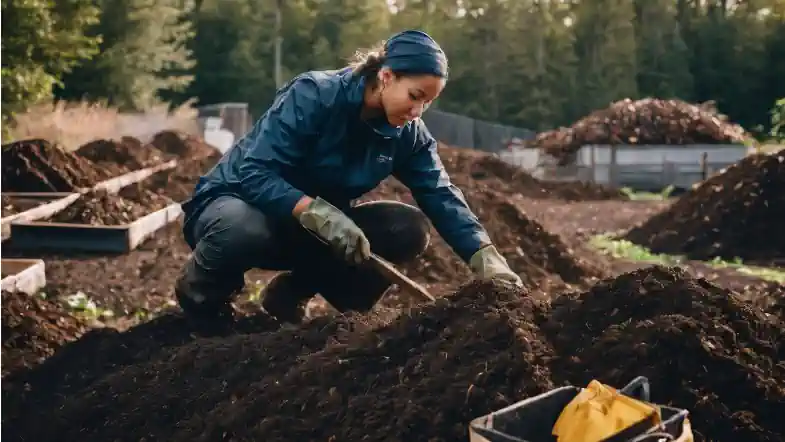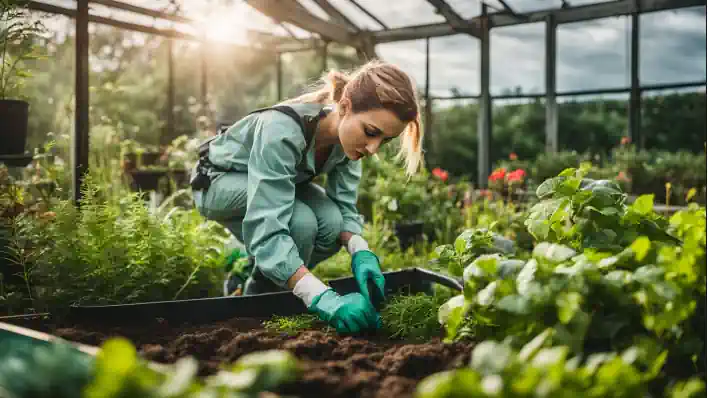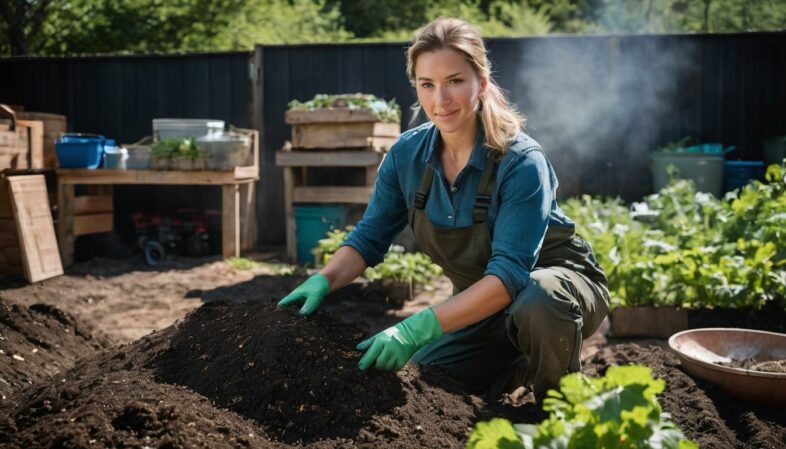If you love composting but find yourself sneezing every time you do it, you're not alone. Many people experience so-called compost bin allergies from the mould and pollen in compost bins. This article will guide you through simple steps to enjoy composting without a runny nose or watery eyes.
Read on for a breath of fresh air!
Key Takeaways for Compost Bin Allergies
- Wash your hands with soap and water after working with compost to remove allergens.
- Wear gloves, a mask, and protective clothing to shield yourself from mould, pollen, and dust.
- Ensure your compost is well-aerated and not too damp to prevent mould growth.
- Turn your compost regularly for healthy decomposition and to reduce odour and pests.
- Use a closed bin or tumbler for composting if you're sensitive to allergens.
Understanding Composting Allergies

Composting allergies can have various effects, including hay fever, asthma attacks, and skin irritations. Proper precautions are crucial because exposure to allergens in compost can lead to serious health issues.

The potential effects of composting allergies
Handling compost can trigger allergic reactions in some people. These reactions might range from mild symptoms, such as sneezing and itchy eyes, to more severe conditions like asthma attacks or even aspergillosis—a serious lung infection caused by mould spores commonly found in decomposing plant matter.
For gardeners and those who tend compost heaps or bins, being aware of these risks is crucial.
Allergies occur when your body's immune system reacts to certain allergens present in the environment. Compost heaps are rich in organic material which supports the growth of moulds, pollens, and bacteria—all common triggers for allergies.
Symptoms can escalate quickly without proper precautions, turning a rewarding activity into an uncomfortable experience. Understanding what causes these reactions helps us take steps towards safer gardening practices—leading us to explore why taking appropriate measures is so important.
Why proper precautions are important
Taking the right safety steps is key to avoiding health issues linked with composting. Compost piles, rich in organic matter, can be a breeding ground for moulds like Aspergillus and bacteria that might cause allergic reactions or even more serious conditions such as sepsis or pneumonia.
Gardeners exposed to these allergens without protective gear can experience symptoms ranging from mild irritations to severe respiratory problems. Considering this, wearing gloves and masks becomes essential for anyone dealing with compost.
Knowing what's in your compost helps you stay safe. For instance, food waste might attract pests or contribute to unwanted bacterial growth if not properly managed. On top of that, certain plants and materials added to the pile could introduce allergens specific to individuals with food allergies or sensitivities—peanuts and pollen from blooms are common culprits.
Therefore, understanding the contents of your compost bin and how they interact is crucial for preventing allergic rhinitis or asthma flare-ups among gardeners keen on keeping their lawns fertile without relying on chemical fertilisers.
Knowing your allergies and sensitivities
Identify what sets off your allergies before diving into composting. Common triggers in compost include pollen, moulds, and dust. If you're unsure about your sensitivities, consider consulting an allergist or immunologist.
They can conduct tests to pinpoint specific allergens that affect you. Knowing these can help tailor your approach to handling compost safely.
With this knowledge in hand, let's explore practical steps to minimise allergic reactions during composting activities.
Tips for Avoiding Allergic Reactions When Handling Compost

Wash your hands thoroughly with soap and water after handling compost. Wear gloves, a face mask, and long sleeves to protect your skin from potential allergens.

Wash your hands after handling compost
Always clean your hands thoroughly after you've finished with the compost heap. Composting is great for recycling garden waste and kitchen scraps, but it can expose you to bacteria and fine particles that might not be good for your skin or health.
A simple step like washing your hands can significantly reduce the risk of bacterial infection or allergic reactions.
Use soap and water to ensure all traces of compost are removed from your skin. This habit protects against common allergens found in composted materials, such as moulds and pollens.
Investing a few minutes in handwashing safeguards your well-being, allowing you to enjoy the benefits of composting without unnecessary health concerns.
Wear protective gear
Putting on protective clothing before diving into your compost bin is a smart move. Gloves shield your hands from potential irritants and allergens lurking in the pile. A mask can be your best friend, especially if you're prone to respiratory issues like asthma, which specialists often warn about.
It blocks those tiny spores and dust particles from making their way into your lungs. Don't forget, protecting your eyes with safety goggles keeps any airborne materials safely away.
Keeping long sleeves and trousers on while handling compost also adds an extra layer of defence against skin reactions such as eczema or rashes that manure and other organic materials might cause.
Gardening in proper boots protects your feet from any sharp objects hidden within the heap. This attire not only guards you against allergies but also ensures a safer composting experience overall, allowing you to enjoy the benefits of enriching soils without unnecessary risks.
Be mindful of pollen and moulds
Pollen and moulds can turn your composting experience into a sneeze fest. These tiny particles thrive in the damp, nutrient-rich environment of your compost bin or pile. They are part of the natural decomposition process but can be trouble for those with allergies.
To keep these allergens at bay, ensure your compost is well-aerated and not too wet. This balance discourages the growth of moulds and keeps pollen under control.
Wearing a mask might seem over the top for some gardeners, yet it's a simple step that makes a big difference. It blocks out microscopic irritants before they trigger any allergic reactions.
Also, choosing to compost materials less likely to produce high amounts of pollen—such as fruit scraps over grass clippings—can help reduce exposure. Next up, let's dive into how you can maintain and turn your compost safely.
How to Be Safe and Responsible While Composting
Properly maintain and turn your compost to ensure even decomposition – this helps prevent odors and the attraction of pests, keeping your composting area clean. For more essential tips on composting safety, head over to the full blog!

Properly maintain and turn your compost
Keeping your compost heap in good shape is key. Turn it every few weeks to help speed up the decomposition process. This ensures your compost gets enough air and prevents any nasty smells from developing.
It's a simple step but really effective for maintaining a healthy compost pile.
Use a garden fork or a compost aerator for this task. Mix everything well so that the materials at the edges are brought into the centre. This method encourages microorganisms to break down organic matter more efficiently, making great quality compost for your plants and reducing the risk of allergenic moulds growing in stagnant areas.
Plus, regular turning helps keep unwanted pests at bay, keeping your gardening efforts safe and productive.
Consider using a closed bin or tumbler
To minimise exposure to allergens, opt for a closed bin or tumbler when composting. These enclosed systems help contain potential irritants like mould spores and pollen, reducing the risk of allergic reactions.
By choosing this option, you create a safer environment for yourself while still enjoying the benefits of composting without compromising your health.
Make sure to position your closed bin or tumbler in an appropriate location that is easily accessible yet not too close to living areas. This arrangement promotes effective composting while keeping potential allergens at bay, ensuring a healthier and more comfortable experience for both you and your garden.
Choose an appropriate location
Select a well-drained area for your compost bin, away from water sources and buildings. Ensure it's easily accessible for adding materials and turning the compost.
The location should receive partial sunlight to encourage decomposition without drying out or becoming too soggy. Avoid placing it near areas where strong odours may cause a nuisance.
Compost Bin Allergies Conclusion: Enjoying the Benefits of Composting Without the Risks
Protect yourself from compost bin allergies by washing your hands after handling compost. Wearing protective gear is important to avoid allergic reactions when dealing with compost.
Properly maintain and turn your compost to stay safe and responsible while composting. Consider using a closed bin or tumbler for added protection. Choose an appropriate location for your compost heap to minimise the risk of allergies.”

FAQs About Compost Bin Allergies
1. What are compost bin allergies, and why should I be concerned?
Compost bin allergies can come from handling compost, which is full of microorganisms and particles like mould spores that might trigger reactions such as sneezing or more serious ones for those with asthma. It's essential to know how to protect yourself—especially if you love gardening but dislike the idea of feeling unwell.
2. How does worm composting help reduce allergy risks?
Worm composting, or vermicomposting, uses earthworms to break down food scraps into worm castings—a type of compost. This method is less likely to produce airborne allergens compared to traditional compost piles because it's a more contained process. Plus, it’s quite fascinating; just imagine those little worms making your garden healthier!
3. Are there any special precautions I should take when working with my composter?
Indeed! Wearing protective gear like gloves and a mask can prevent direct contact with allergens in the compost material. Also, keeping your composter at a reasonable distance from your living area minimises unwanted exposure—even if it means walking an extra few steps each day.
4. Can changing my diet affect how I react to these allergies?
Interestingly yes—nutrition plays a part in our body's reaction to allergens. Including foods rich in omega-3 fatty acids and avoiding those that may worsen inflammation could potentially offer some relief from allergic reactions.
5. Who should I consult if I suspect I have a severe allergy related to composting?
If symptoms persist or worsen despite taking precautions, seeing an allergist or immunologist might be wise—they have the expertise necessary for diagnosing and treating various allergies linked not only to outdoor work but also to everyday life indoors.
6. Is there any technological support available for managing this issue effectively?
Yes! Thanks to social media platforms and websites dedicated specifically to gardening enthusiasts, accessing video tutorials on safe practices around vermicomposting—or finding advice directly from professionals—is easier than ever before.







